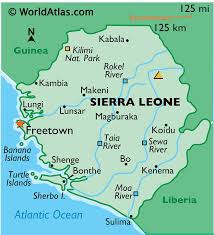By Hassan Osman Kargbo
As Sierra Leone marks its 64th Independence Anniversary on April 27, 2025, the celebration comes with a bitter-sweet taste. For a country that gained its freedom from British colonial rule in 1961, expectations were high for a future filled with promise, development, and prosperity. Yet today, many Sierra Leoneans are left asking: What have we really achieved in 64 years of independence?
The answer, for many citizens, lies not in the fanfare of Independence Day parades or ceremonial speeches, but in the harsh realities of daily life and the realities marked by power cuts, poor infrastructure, economic hardship, and a system that often fails to serve its people.
Persistent Power Outages is still an issue at 64. One of the most glaring issues plaguing Sierra Leone is the persistent and widespread power shortage. Despite years of promises and millions of dollars spent on energy projects, most parts of the country still lack reliable electricity. Even in the capital, Freetown, blackouts are frequent and prolonged. In rural areas, electricity remains a distant dream.
The situation hampers productivity, affects students’ ability to study, and cripples small businesses that rely on stable electricity. For a nation striving to advance in the modern world, this basic necessity remains elusive.
Poor Road Network is also another issue. Traveling within Sierra Leone is often a test of patience and endurance. From pothole-ridden urban roads to muddy, impassable rural paths, the country’s road network reflects decades of neglect and mismanagement. Roads connecting major cities and towns are in dire condition, and during the rainy season, entire communities are cut off due to flooding and landslides.
This infrastructure deficit doesn’t just inconvenience travelers—it stifles trade, affects food supply chains, and isolates communities from critical services like healthcare and education.
Unemployment and Economic Struggles are another burden to the people.
The country’s economic challenges are no secret. Youth unemployment remains alarmingly high, with thousands of graduates unable to find gainful employment each year. Many young people are forced into the informal sector or resort to risky ventures, including migration under dangerous conditions.
The cost of living continues to soar, with inflation eroding the purchasing power of ordinary citizens. While government officials often speak of economic reform, the average Sierra Leonean sees little change in their day-to-day struggles.
Health and Education Systems in Crisis
Sierra Leone’s healthcare system is another area that remains critically underdeveloped. Hospitals are understaffed and poorly equipped, especially in rural areas. Access to quality healthcare is still a privilege rather than a right. Although strides were made after the Ebola outbreak, the system continues to face chronic shortages of medicines, equipment, and trained personnel.
In education, schools often operate without enough trained teachers or basic learning materials. Classrooms are overcrowded, and in some parts of the country, children still sit on the floor to learn. Public universities face frequent disruptions due to strikes and lack of funding, leaving students in limbo.
In addition, Corruption and Governance. Many of Sierra Leone’s problems can be traced back to poor governance and corruption. Public funds are often mismanaged or embezzled, and accountability remains weak across many institutions. Projects are announced with fanfare but die in silence due to lack of oversight or political will.
While every government promises change, few have delivered real, lasting reforms. The public’s trust in political leadership is increasingly eroded, and many citizens feel disenfranchised and voiceless in decisions that affect their lives.
What Is There to Celebrate?
Despite these challenges, Sierra Leoneans continue to show resilience and patriotism. They celebrate not just independence from colonial rule, but the strength of a people who have endured civil war, epidemics, and natural disasters. The country’s rich culture, natural beauty, and human capital remain sources of pride.
But true celebration demands more than resilience—it requires progress. It demands that leaders stop using Independence Day as a public relations exercise, and instead treat it as a time for reflection and commitment to real change.
The Way Forward
At 64, Sierra Leone should be at a much different place. Countries that gained independence around the same time—like Singapore, Malaysia, and Botswana—have made significant strides in infrastructure, education, and economic development. Sierra Leone, blessed with natural resources and a youthful population, has the potential to do same.
What is needed now is a bold, visionary leadership that prioritizes the welfare of the people over political gain. Investment in key sectors, firm action against corruption, and a renewed sense of national purpose are crucial if the next decade is to look different.
As Sierra Leoneans wave the green, white, and blue flag this year, the celebration must come with a call to action: the country deserves better. The people deserve better. And the future must be different.













